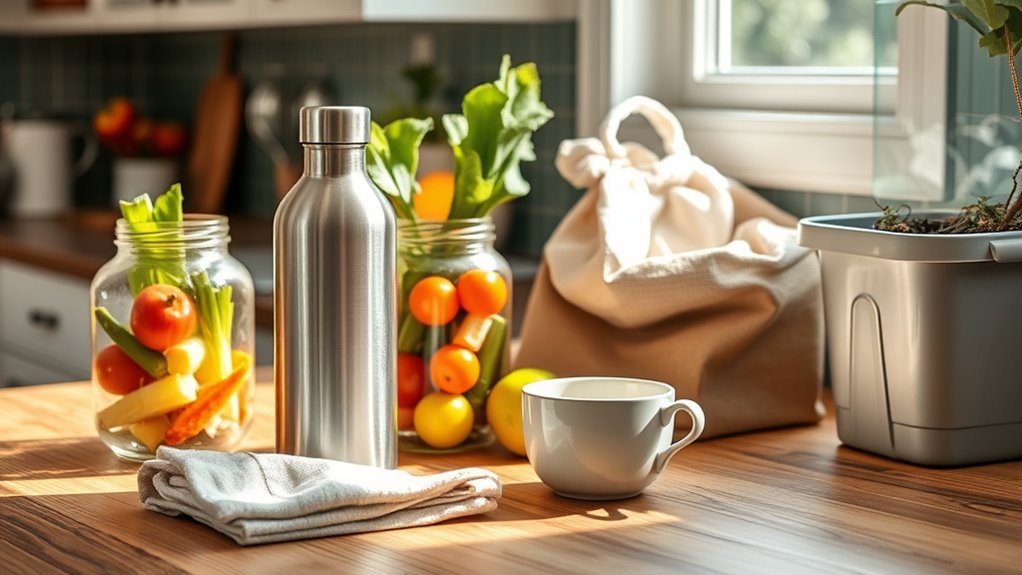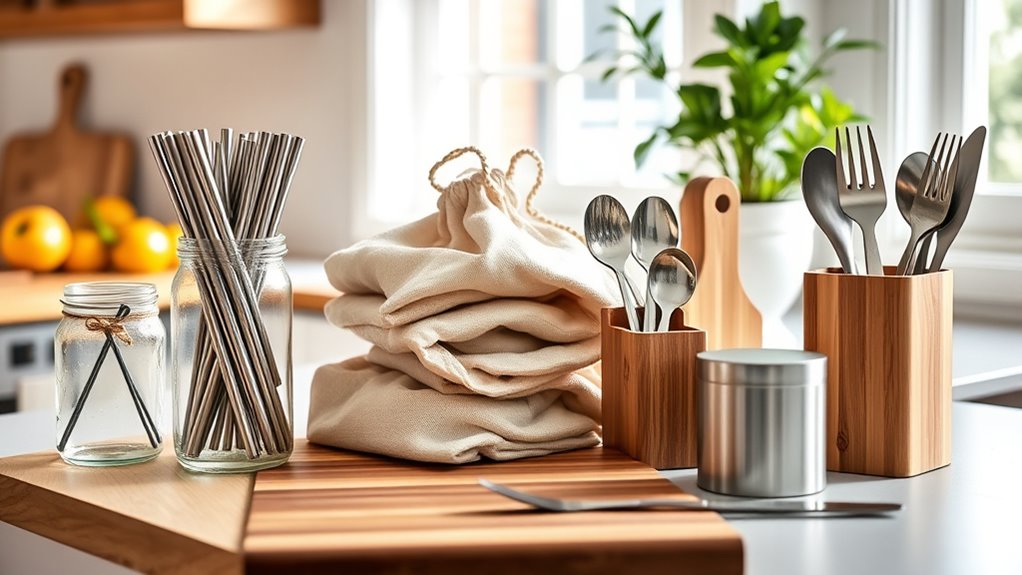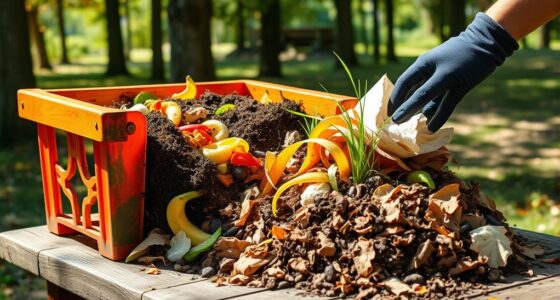To reduce single-use plastics in daily life, you can switch to reusable items like water bottles, bags, and containers. Opt for products with minimal eco-friendly packaging and avoid plastic wrap when possible. Bringing your own utensils, straws, and cups helps cut waste. Supporting brands committed to sustainability and making mindful shopping choices also make a difference. Small changes like these can add up, so keep exploring simple ways to make a lasting impact.
Key Takeaways
- Use reusable water bottles, bags, and containers to replace single-use plastics daily.
- Opt for products with minimal or eco-friendly packaging when shopping.
- Bring your own utensils, straws, and cups when dining out or on the go.
- Support brands that prioritize sustainable packaging and environmentally friendly practices.
- Educate others about reducing plastic waste to amplify positive environmental impact.

Single-use plastics pose a considerable threat to our environment, and reducing their use is essential for sustainability. Every time you choose a plastic bag, bottle, or utensil, you’re contributing to a growing plastic footprint that harms ecosystems and wildlife. But the good news is, small changes in your daily routine can make a big difference. By opting for reusable alternatives, you actively cut down on single-use plastics and help lessen the burden on landfills and oceans. For instance, replacing plastic water bottles with a durable, reusable bottle means fewer bottles will end up polluting the environment. Similarly, swapping disposable shopping bags for cloth totes can notably reduce plastic waste, especially if you carry them consistently.
You can also rethink your approach to food storage and takeout containers. Instead of relying on plastic wrap or single-use containers, invest in glass or stainless steel options that are easy to clean and reuse. These choices not only reduce your plastic footprint but also tend to last longer and are often healthier for storing food. When dining out, bring your own utensils, straws, and cups made from sustainable materials. This simple switch prevents countless plastic items from being used once and discarded.
Another impactful step is to be mindful of packaging when shopping. Look for products with minimal or eco-friendly packaging, and support brands committed to reducing plastic waste. Bulk buying items reduces packaging waste and allows you to use your own containers. Additionally, consider purchasing items in larger quantities to cut down on packaging waste per unit, further decreasing your overall plastic footprint.
You don’t have to overhaul your entire lifestyle overnight. Small, consistent actions add up over time. Make a conscious effort to carry reusable bags, bottles, and containers with you. Educate friends and family about the importance of reducing single-use plastics, creating a ripple effect that extends beyond your household. Over time, these habits become second nature, and you’ll be contributing to a healthier planet. Remember, every reusable alternative you choose not only minimizes waste but also sets a positive example for others to follow. Reducing single-use plastics isn’t just about individual effort; it’s about fostering a sustainable mindset that benefits everyone. Your choices matter, and by making smarter, eco-friendly decisions, you help protect the environment for future generations. Incorporating the use of necessary cookies can also improve your online experience while being mindful of privacy considerations.
Frequently Asked Questions
How Do Single-Use Plastics Impact Marine Life?
Single-use plastics harm marine life by becoming marine debris that animals mistake for food. You might not realize that fish, turtles, and seabirds ingest plastic, leading to injury or death. When you reduce plastic use, you help prevent plastic ingestion and keep oceans cleaner. Your efforts can protect marine ecosystems, ensuring the creatures living there thrive without the threat of harmful debris polluting their habitats.
What Are the Best Reusable Alternatives for Daily Use?
Switching to reusable containers is like planting seeds for a greener future. You’ll find eco-friendly straws and durable, leak-proof containers are your best allies for daily use. These alternatives cut down waste, save money, and reduce plastic pollution. Carry a stylish, reusable water bottle everywhere, and swap disposable straws for stainless steel or silicone ones. Small changes like these make your daily routine more sustainable and impactful.
Are There Government Policies Reducing Plastic Waste?
Yes, government policies are actively reducing plastic waste through strict policy enforcement and raising public awareness. You’ll see regulations banning single-use plastics, encouraging reusable alternatives, and implementing recycling programs. These policies aim to motivate you to reduce plastic use and recycle effectively. By staying informed and supporting these initiatives, you help strengthen policy enforcement and contribute to a cleaner environment for everyone.
How Can Businesses Minimize Their Plastic Footprint?
You can minimize your business’s plastic footprint by adopting strong corporate responsibility practices. Switch to eco-friendly packaging and collaborate with suppliers committed to sustainable supply chains. Encourage your team to reduce plastic use and implement recycling programs. Track your progress regularly, set clear goals, and communicate your efforts to customers. These steps show your commitment to sustainability, helping you reduce plastic waste and improve your company’s environmental impact.
What Are Effective Ways to Recycle Plastics Properly?
Think of recycling plastics like sorting treasures in a chest; you need to separate them carefully. To do this effectively, focus on plastic sorting—keep different types apart. Look for recycling symbols on containers to know what’s recyclable. Properly rinsing plastics before recycling prevents contamination. By following these steps, you make certain your plastics are recycled properly, turning waste into new resources and helping the environment stay healthy and vibrant.
Conclusion
Imagine your daily choices are like planting seeds in a garden. Every small step you take to reduce single-use plastics is a seed that grows into a healthier planet. When you refuse a plastic bag or choose reusable bottles, you’re watering this garden of change. Over time, these tiny actions bloom into a vibrant landscape of sustainability. Together, we can nurture this garden, transforming our world into a beautiful, plastic-free haven for generations to come.









